| Your Passport to
Olympic History |
 asten your seat
belts and prepare to take off for a journey back in time. A journey back
to India's Golden Age of Hockey (1928 - 1956), when India did not lose a
single game in the Olympics. asten your seat
belts and prepare to take off for a journey back in time. A journey back
to India's Golden Age of Hockey (1928 - 1956), when India did not lose a
single game in the Olympics.
Shown below is a piece of Olympic memorablia from the 1928 Olympic
Games. This is the Olympic Passport of Indian hockey player William James
Goodsir-Cullen. His brother Earnest Goodsir-Cullen played in the 1936
Berlin Games.
Both William and Earnest were educated in St. George's College in
Mussorie, the Queen of the
Hills. Alumni of St. George's college have won 6 Olympic hockey gold
medals (for India), and 1 bronze medal (for England).
Ernest went on to study medicine, lived in England and eventually
settled in Ireland. William James worked for his uncle, then for an oil company, joined the army for
World War II, lived in Canada for a few years, before settling down in Australia in the late-1950s.
Both the Goodsir-Cullen brothers are now dead.
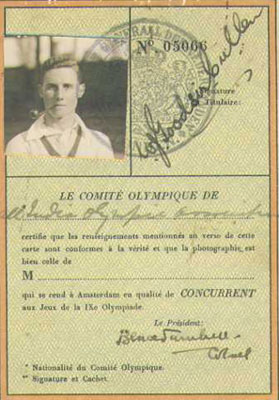 |
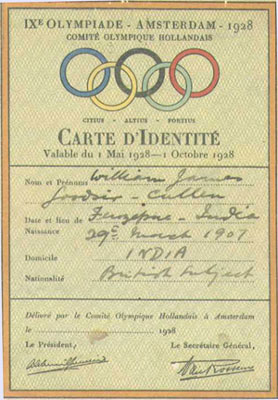 |
| Courtesy Dayan Goodsir-Cullen,
grandson of William James Goodsir-Cullen |
|
| After Bhaskaran Who?
- 3 Choices from 3 Countries |
 his
happens in other sports, in other countries. Brazil's soccer coach lost his job over Brazil's
poor showing in the Olympics. England's soccer coach and former star Kevin
Keegan resigned when England lost to Germany in a World Cup qualifying
match. The entire Iraqi football federation was disbanded following the national side's
elimination in the Asian Cup. his
happens in other sports, in other countries. Brazil's soccer coach lost his job over Brazil's
poor showing in the Olympics. England's soccer coach and former star Kevin
Keegan resigned when England lost to Germany in a World Cup qualifying
match. The entire Iraqi football federation was disbanded following the national side's
elimination in the Asian Cup.
What does Indian coach Bhaskaran do after coaching India to 9th place
in the World Cup and 7th place in the Olympics. The answer - cling on to
his job, at any cost.
If Bhaskaran doesn't want to accept responsibility for India's showing,
he is no worse than a common politician who refuses to vacate his chair.
But then, Bhaskaran's role models are Gill and Kandasamy, president and
secretary of the IHF, who have presided over the India's two worst
placings in Olympic hockey without any sense of moral responsibility.
In this rebuilding phase between the Olympics (2000) and the World Cup
(2002), now is the time to experiment with a foreign coach for the Indian
hockey team. Three top candidates in the world come to mind - Paul Lissek
of Germany, Ric Charlesworth of Australia and Maurits Hendriks
of Holland.
Paul Lissek
reportedly likes the lifestyle of Asians and their ideals and values. Rumours are rife that Lissek
may consider coaching in Malaysia.
Lissek has already been working for the MHF as a consultant, and will be
preparing their team for the World Cup in KL in 2002.
Another great choice could be Ric Charlesworth, who recently announced his
retirement as coach of the Australia's women's team - the greatest women's
hockey team of all time. He has coached a team that has not lost in 18
consecutive Olympic matches, and which was voted Australian Team of the
Year five years in a row from 1994 to 1998.
During the Ric Charlesworth era, the Australian Hockeyroos won 9 major
titles -- 2 Olympics, 2 World Cups, 4 Champions Trophies and 1
Commonwealth Games. His record of 198 wins, 25 draws and 30 losses - a
winning percentage of 78 - may never be topped.
The final piece of the puzzle comes from the news that the Dutch Hockey
Federation has not renewed the contract of national coach Maurits Hendriks.
"The team has performed exceptionally in the past 2 years"
said Hendriks. "Then you start thinking is this not the moment to
look further?" Hendriks does not know what he will be doing next
year. "This could also be in a different sport, providing it is in a
prestigious surrounding."
When last checked, the IHF was awaiting a panel of names from the
International Hockey Federation for a second-tier coach. IHF President K.
P. S. Gill clarified that the person selected
would assist the Indian coach and not replace him.
Gill said that a Canadian sports psychologist who had worked with one
of the teams in Sydney is also being considered, though he did not name
the individual.
"He should be joining the team in January," he said, adding
that the terms of the contract were yet to be worked out.
|
| World's Only 4-Time
Hockey Medallist |
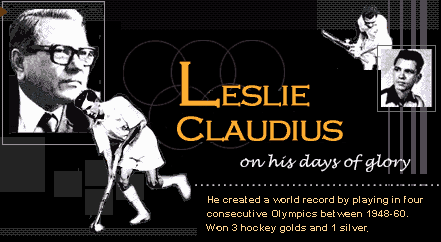
Article by Payal Singh Mohanka, Graphic Courtesy
Rediff
 he world's only living 4-time Olympic
hockey medallist, Leslie Claudius, was the first Indian to play in
four consecutive Olympics, from 1948 - 1960. The hockey legend looks back
on an illustrious career. he world's only living 4-time Olympic
hockey medallist, Leslie Claudius, was the first Indian to play in
four consecutive Olympics, from 1948 - 1960. The hockey legend looks back
on an illustrious career.
"I was initially a footballer," he recalls, with a smile,
playing for the Bengal Nagpur Railways (BNR) football team. It
was during the 1946 Beighton Cup hockey tournament that his career in
the game began.
Just before the match, the centre-half of the BNR team was injured. And suddenly, much
to his amazement, Claudius, who was watching the game, found a hockey
stick being thrown towards him. The team's captain, Dickie Carr, who
played football with him, was asking him to join the game. Claudius took up the
challenge and entered the field.
For the next 10 days he continued to play for the BNR team, taking
his team to the final. This marked the beginning of his hockey career.
For Claudius it was time to say farewell to football. Claudius fondly remembers the
encouragement given to him by Olympians like Joe Gallibardy, Carl Tapsell
and Dickie Carr, who all played for BNR too. Though he never played with
Dhyan Chand, Claudius has fond memories
of the Wizard, who was a good friend.
"His stickwork was brilliant. Once I remember the audience even
examined his stick to check if there was glue on it! When I was playing,
he was a selector." A smile lights up his face as he adds,
"And Dhyan Chand would say, 'Claudius selects himself, now I have
to select the rest of the team!'"
The opening ceremony of the 1948 London Olympics was a heady
experience for the 21-year-old Claudius. "As the Indian contingent
stepped into the arena there was a resounding applause. The world
champions had arrived. We were elevated into heaven. It was a wonderful
feeling!" he recalls.
Claudius won the gold medal at London (1948), Helsinki (1952)
and Melbourne (1956). But mention of the 1960 Rome
Olympics, where he captained the side, stirs memories of disappointment.
Claudius says, "Our team played brilliant
hockey. We did not take advantage of our
superiority. That's why it was sad. Even today that hurts. If they were
better, then there would be no regrets."
For the Indian team, it was a case of one crucial mistake. Both the
defenders thought the other was going for the ball but it trickled past.
Pakistan took advantage of this lapse and won by one goal.
Claudius received the Padma Shri a decade after his retirement
from international hockey. In the seventies Claudius managed the Indian
teams to Teheran (1974), Bangkok (1978) and Australia. From 1982-1984,
he was an observer on the technical committee.
Claudius retired from the Calcutta customs as an assistant collector
after 36 years of service. He is now 73 years old.
The present scenario for hockey is dismal in India,
where the sport is at its lowest ebb. If he was reborn a sportsman and
had to choose his sport, it would be cricket.
|
| South Asia Worst in
World Sport |
 t the
end of the Sydney Olympics, South Asia, home to 1.5 billion people, home
to one of every four people in the world, got a grand total of two bronze
medals. Both were won by women - Karanam Malleswari (India) in
weightlifting and Susanthika Jayasinghe (Sri Lanka) in the 200 m. t the
end of the Sydney Olympics, South Asia, home to 1.5 billion people, home
to one of every four people in the world, got a grand total of two bronze
medals. Both were won by women - Karanam Malleswari (India) in
weightlifting and Susanthika Jayasinghe (Sri Lanka) in the 200 m.
Among the other South Asian countries, Bangladesh, Bhutan, Myanmar,
Nepal and Pakistan had zero medals, while Afghanistan did not participate.
Overall, Asian countries won 43 gold, 39 silver and 44 bronze medals
in the Sydney Olympics. The Asia-Pacific region (China, Korea and Japan)
led Asia's charge at Sydney, winning a combined 41 gold, 33 silver and 31
bronze medals, with South Asia bringing up the rear with its 2 bronze
medals.
How did India and Pakistan fare with respect to the other
hockey-playing countries?
| Country |
Rank |
Medals |
Total |
| Australia |
4 |
16G, 25S, 17B |
58 |
| Germany |
5 |
14G, 17S, 26B |
57 |
| Holland |
8 |
12G, 9S, 4B |
25 |
| Britain |
10 |
11G, 10S, 7B |
28 |
| South Korea |
12 |
8G, 9S, 11B |
28 |
| Poland |
14 |
6G, 5S, 3B |
14 |
| Canada |
24 |
3G, 3S, 8B |
14 |
| Spain |
25 |
3G, 3S, 5B |
11 |
8 of the 12 countries in the men's hockey competition finished in the
top 25. Of the remaining 4, Argentina won 2 silver and 2 bronze, India got
a solitary bronze, while Pakistan and Malaysia finished empty-handed.
In 104 years of the Olympic Games, from Athens (1896) to Sydney (2000), India has a measly total of
14 medals - eight gold, one
silver and five bronze.
Australia, Germany, Holland, Britain and Korea got more gold, silver
and bronze medals in one Olympics (Sydney 2000), than India has got in 104 years of the Olympics.
The Australian Bureau of Statistics
measured the number of medals on a per capita basis, and put India at the bottom,
pitting its lone bronze against a one billion people. In contrast, Barbados with a bronze against a population of
207,000 was placed at
the top. India had sent its minister of state for sports, Syed Shahnawaz
Hussain, to Sydney as part of the Olympic contingent. Hussain told the
media in Sydney, "In Australia there is accountability,
but not in India. But I'm going to fix responsibility on everyone, ask
federations to tell us what they had done in the past 10 years." Shahnawaz returned home
only to discover that he had a new portfolio!
|
| The Playing Fields
of Europe |
 he
battle for world hockey supremacy is won on the playing fields of Europe.
Holland, Germany and England have the toughest hockey leagues in the
world, attracting the best talent from the various hockey playing
countries. he
battle for world hockey supremacy is won on the playing fields of Europe.
Holland, Germany and England have the toughest hockey leagues in the
world, attracting the best talent from the various hockey playing
countries.
Penalty corner maestro Sohail Abbas play in the Dutch
hockey league, as do his compatriots Shahbaz Ahmed and Tahir Zaman.
Korean superstar Seong Tae Song starred in the German Bundesliga, as did
Russel Garcia of England.
England's national hockey league(s) have the most number of foreigners
signed up. At last count, 24 foreign players from 7 countries are playing
league hockey in England, as shown in the table below:
Premier Division
| Team |
Player |
Country |
| Canterbury |
Brian Garcia
Kwan Browne |
Trinidad & Tobago
Trinidad & Tobago |
| Old Loughtonians |
Andy Griffiths
Hari Kant
Scott Smith
Peter Milkovich
Brett Stephen |
Canada
Canada
Canada
Canada
South Africa |
| Reading |
Todd Williams
Grant von Mayer
Eiko Rott
Torben Gottschau
Simon Towns
Ken Robinson |
Australia
Austria
Germany
Germany
New Zealand
New Zealand |
| Southgate |
Grant Smith
Greg Clark
Steve Evans |
Australia
South Africa
South Africa |
| Surbiton |
Craig Jackson
Greg Nicol |
South Africa
South Africa |
Other Divisions
| Division |
Team |
Player |
Country |
| I |
Hampstead |
Benjamin Simes
Greg Pierce
Justin King
Craig Carolan |
Australia
New Zealand
South Africa
South Africa |
| II |
Hounslow |
Max Diamond |
Australia |
| Midland |
Belper |
Craig Keegan |
Australia |
If the IHF cannot come up with a National Hockey League of its own, the
least it can do is to give clearances to Indian players to play in the
leagues abroad. That way the players get to earn their living, sharpen their
skills in the tough European circuit, and learn European coaching styles. In short, a win-win situation for all.
|
| Global Ambassador of
Indian Hockey |
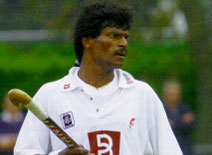 |
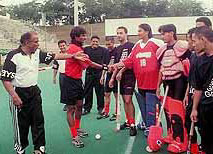 |
| Dhanraj in the Bundesliga |
Dhanraj in the Malaysian League |
 hel
Ratna (Jewel of Sport) Dhanraj Pillai is the only Indian playing
hockey in a foreign league. Dhanraj's year 2000 schedule has seen him play
hockey in Europe, Asia and Australia. hel
Ratna (Jewel of Sport) Dhanraj Pillai is the only Indian playing
hockey in a foreign league. Dhanraj's year 2000 schedule has seen him play
hockey in Europe, Asia and Australia.
| Month |
Location |
Tournament |
Results |
| Jan 2000 |
Barcelona |
4-Nation Tournament |
3rd |
| Feb 2000 |
Kuala Lumpur |
10th Azlan Shah Cup |
3rd |
| Apr 2000 |
Sydney
Perth |
4-Nation Tournament
4-Nation Tournament |
3rd
1st |
| May - Jun |
Stuttgart |
Bundesliga |
4th in League |
| Sep 2000 |
Sydney |
Olympic Games |
7th |
| Oct 2000 |
Stuttgart |
Bundesliga |
Lost in Quarters |
| Nov 2000 |
Kuala Lumpur |
Malaysian League |
Ongoing |
Here's hoping that other Indian internationals will join Dhanraj in
being the global ambassadors of Indian hockey.
|
| India a One-Sport
Nation |
Article by Rohit Brijnath, courtesy India
Today
 e
have got to stop being a one-sport-nation (cricket). We have got to give
hockey and its players respect, we've got to make it worthwhile for
fathers to buy their sons hockey sticks. e
have got to stop being a one-sport-nation (cricket). We have got to give
hockey and its players respect, we've got to make it worthwhile for
fathers to buy their sons hockey sticks.
If you and I show up every time India plays a hockey match, or shake
Jude Menezesí hand when we see him (hell, just recognise him, that'll be
enough), you'll never know what we could kick-start.
They say, people only follow winning teams. This is bogus because we
would have switched off our television sets years ago when we saw a
cricketer. Sure, the hockey team loses, but if we support them, maybe
they'll draw strength from that. There's a romance here worth igniting,
and not just once in four years.
The problem is with you and me. Every four years we wake up and beat
our chests and transform into John Milton when it comes to Indian hockey.
All we talk about is Paradise Lost and Paradise Regained.
When the Olympics arrive, sponsors start promising lakhs if the team
wins and state governments promise houses. But for India to have a chance
of a medal, the lakhs and the houses have to come before, not after. Our
hockey players are poor and unknown, not the advertisement any game
requires.
Olympic fever will abate, cricket will resume, and hockey will be
locked into some obscure corner of the national memory, to be opened only
a few months before Athens 2004.
And then we wonder, why we come 7th?
|
| Grassroots Hockey in
India - Part I |
 he
Nehru Hockey Tournament Society showed its commitment to grassroots hockey by conducting the 7th Nehru junior hockey tournament (girls) in New Delhi. he
Nehru Hockey Tournament Society showed its commitment to grassroots hockey by conducting the 7th Nehru junior hockey tournament (girls) in New Delhi.
Schools from 9 different cities of India participated in the Super
League phase, held from October 15 -
October 20. The list of schools, representing all areas of India except
the east, is given below:
| State |
City |
School |
| Chandigarh |
Chandigarh |
Government Girls Model Sec.
School |
| Delhi |
Delhi |
Mother Khazani Convent School
Thapar High School |
| Goa |
Bardez |
St. Anthony's High School |
| Haryana |
Shahabad |
SGNP Girls Senior Sec. School |
| Kerala |
Thiruvananthapuram |
G. V. Raja Sports School |
| Madhya Pradesh |
Dharamjai Garh |
Govt Girls Higher Sec. School |
| Maharashtra |
Pune |
Krida Probidhini |
| Tamil Nadu |
Dindigul |
Augustinar Girls Higher Sec.
School |
| Uttar Pradesh |
Lucknow |
Nari Shiksha Niketan |
In the final, Mother Khazani Convent School beat S. G. N. P. Girls Senior
Secondary School in sudden death.
Both teams were tied 3-3 at the end of the regulation time and the
tie-breaker also failed to break the deadlock. In sudden death, Neelam
scored for the winners while the Gagandeep failed for the Haryana team.
|
| Grassroots Hockey in
India - Part II |
 ame
organisers, same venue, but this time a tournament for junior boys. The
Nehru Hockey Tournament Society showed its commitment to grassroots hockey by conducting the 29th Nehru junior hockey tournament (boys)
at the National Stadium in New
Delhi, from October 21 to Nov 2. ame
organisers, same venue, but this time a tournament for junior boys. The
Nehru Hockey Tournament Society showed its commitment to grassroots hockey by conducting the 29th Nehru junior hockey tournament (boys)
at the National Stadium in New
Delhi, from October 21 to Nov 2.
12 schools from 11 different cities of India qualified for the Super
League phase of the tournament, as shown in the table below:
| State |
City |
School |
| Delhi |
Delhi |
Union Academy Sr. Sec. |
| Haryana |
Sonepat |
Chotu Ram Zamindar Sr. Sec. |
| Karnataka |
Bangalore |
Army Boys Sports Corps |
| MP |
Bhopal |
TN Convent Higher Sec. School |
| Orissa |
Rourkela |
Birasmunda Vidyapeetha |
| Punjab |
Jalandhar
Sri Badhani Sahib |
Lyallpur Khalsa Sr. Sec.
School
Satguru Partap Singh Academy |
| UP |
Lucknow |
CGS Sports College
SSNV Inter-College |
| West Bengal |
Calcutta |
Khalsa High School |
| XX |
Danapur |
Army Boys Sports Corps |
| XX |
Gumla |
St. Ignatius High School |
The semi-final lineup was made up of
Satguru Partap Singh Academy (Sri Badhani Sahib), Birsamunda Vidyapitha
(Rourkela), St. Ignatius High School (Gumla) and Lyallpur Khalsa
Senior Secondary School (Jalandhar).
In the first semi-final, St. Ignatius School beat Lyallpur Khalsa
School 1-0, while in the other semi-final, Birsamunda Vidyapitha edged
Satguru Partap Singh Academy 5-4 in the tie-breaker, after being tied
2-all at the end of regulation time.
In the final played on November 2, St. Ignatius High School defeated
holders Birsamunda Vidyapitha 4-2 via tie-breaker to win the 29th Nehru
junior hockey tournament. Both teams were tied 1-1 at the end of the
regulation period, with both the goals coming in the first half.
|
| Tailpiece - Will the
IHF Expand? |
 ith
the notification of three new states on November 1 - Uttaranchal,
Chattisgarh and Jharkhand, will the IHF give affiliation to these new
states? Maybe not in time for the Senior National Hockey Championship
(November 28 - December 16 in Jammu), but sometime in the next year. ith
the notification of three new states on November 1 - Uttaranchal,
Chattisgarh and Jharkhand, will the IHF give affiliation to these new
states? Maybe not in time for the Senior National Hockey Championship
(November 28 - December 16 in Jammu), but sometime in the next year.
The IHF can follow the example of its cricketing counterpart - the
Board of Control for Cricket in India (BCCI), which has set up a
two-member committee to visit the three new states, study their
infrastructure and other facilities, and submit recommendations on their
affiliations. The two-member committee would comprise a former test player
(Shivlal Yadav) and an official (Ratnakar Shetty).
Among the three states, Jharkand has a rich talent pool of tribal
hockey players, both men and women, many of whom have played at the international
level.
|
![]()